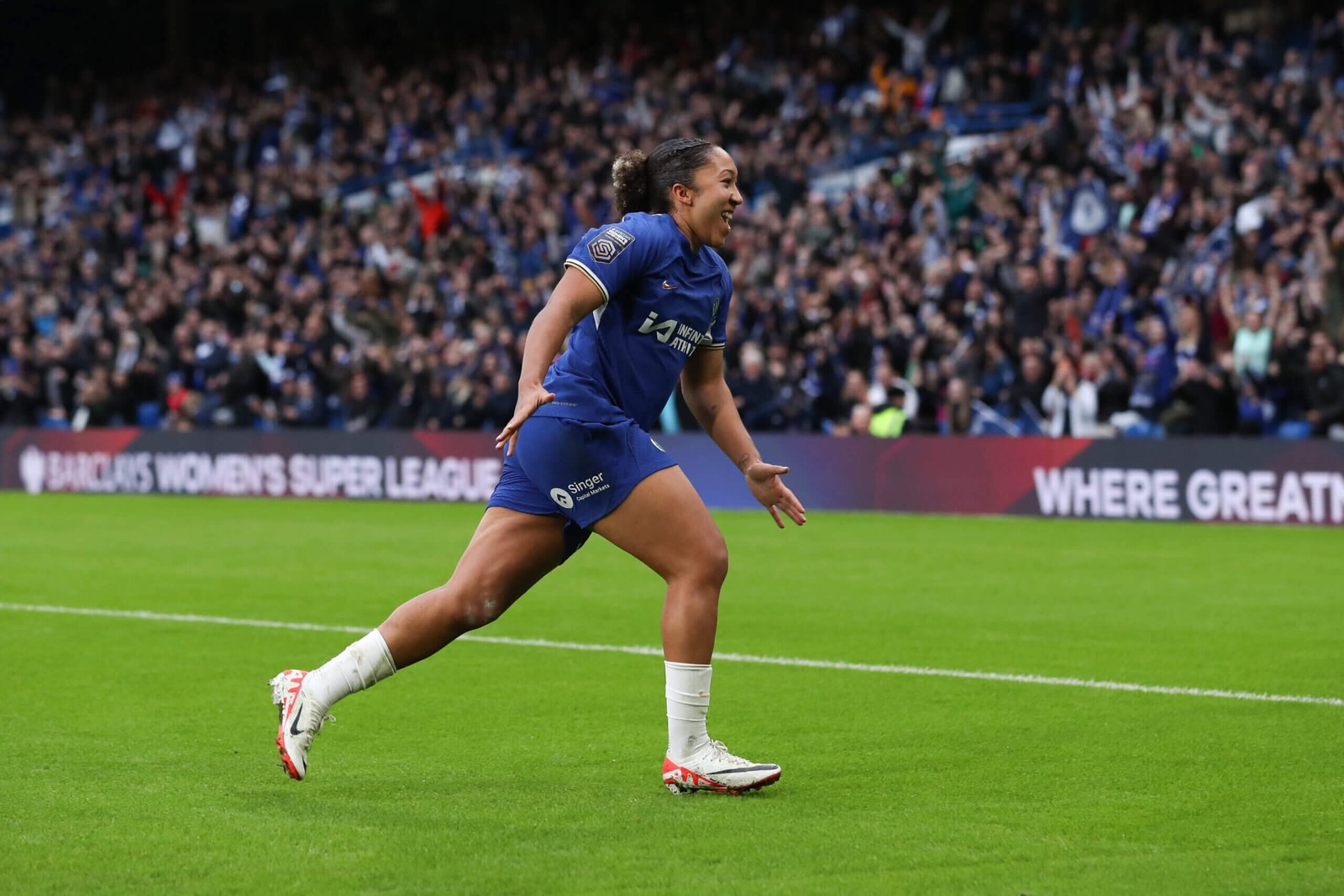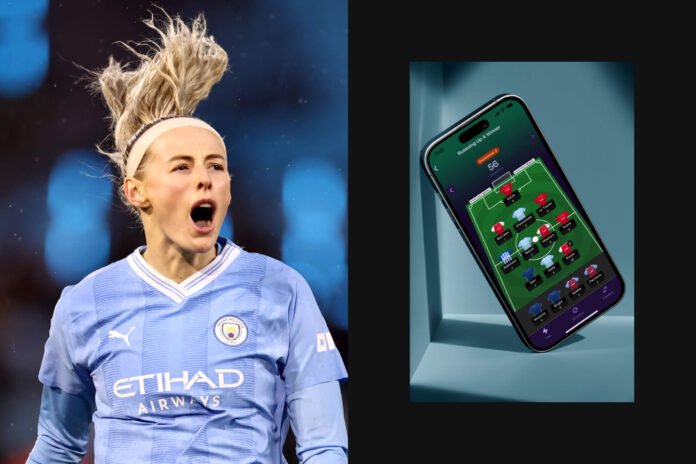Over the past decade, the ubiquity of fantasy football has increased tenfold.
The Premier League version of the game has almost quadrupled in size in 10 years, up to a high of 11.4 million players worldwide. For many participants, playing fantasy football is part and parcel of consuming, enjoying and appreciating the sport, and it has spawned its own industry of content creators.
So when Dani Goncalves and Jimmy Thompson got into women’s football during its 2022 European Championship, they were looking for something similar for the Women’s Super League.
“For us, FPL (the Premier League’s official fantasy game) is super-helpful for learning about the whole league,” says Goncalves. “And we just couldn’t find something (in women’s football) that was to the standard that we were used to with FPL.”
With Goncalves’ background in community building and Thompson’s in app development, they decided to take on the challenge themselves, putting their heads together and creating Fantasy WSL.
(photo courtesy of Fantasy WSL)
Technically, Fantasy WSL is not the first WSL-based fantasy football game. ShePlays is an Australian not-for-profit that runs a variety of fantasy football competitions for the AFLW in Australia, the NWSL in America and the WSL in the UK. But Fantasy WSL is a much closer match to what players of FPL would be familiar with, as well as iterating on that game.
Goncalves explains: “Part of it has been like, ‘This is what is missing from what I’m used to in FPL’, and part of it has been like, ‘Oh, this is what annoys me about FPL. Let’s make that better here’.”
The game has grown from 150 users in its first season last year to now more than 30,000.
“The learning curve has been interesting,” Goncalves says. “When we came into it, we wanted to be able to use this game to learn about the league further down than just the top four teams.
“Next season, we will maybe change some things around our pricing because as it is, you can obviously have three (players) from each team in your squad and that is great because it forces you to look outside the team that you support. But the pricing still means that you can have a really great squad from the top four teams.”
Izzy Duddy, director of strategy at Fantasy WSL, says that helping to direct participants to the high-scoring players is one of their key challenges.
“People are definitely playing with their heart,” Duddy says. “How do we give people a little bit more stats, for them to really make the best choices in the game?

Lauren James of Chelsea is among Fantasy WSL’s highest scorers (Jacques Feeney/Offside/Offside via Getty Images)
“We try and use our socials to boost the players who actually are scoring points and are great to have on your team. They might not be people that fans know about.”
The desire for Fantasy WSL managers to put their favourites in the game regardless of the number of points they are scoring has been highlighted by the high ownership rate of someone such as Leah Williamson, despite Arsenal’s England captain missing the first four months of the season as she recovered from an ACL knee injury suffered last April. But Martha Thomas (Tottenham), Elisabeth Terland (Brighton) and Megan Finnigan (Everton) have all been options outside the WSL’s top four whose ownership has been steadily rising as the season progresses.
Building out a community through social media has helped boost engagement with both the real-life football and the game, and is something the Fantasy WSL team have really prioritised.
“Our tone of voice and what the (women’s football) community want mesh perfectly,” says Goncalves.
“One day, we dropped (Arsenal player) Katie McCabe’s price and people went crazy. They were doing edits putting the Tesco’s reduced sticker on her (in photos). We’re like, ‘Cool, we’ll match that energy!’.”
When Katrina Gorry was confirmed as West Ham’s new signing a month ago, Fantasy WSL celebrated it by putting a tweet out saying that if the post got one like, it would add Harper Gorry (the player’s two-year-old daughter) to the game. It became its second most-liked tweet ever and Harper was snapped up when added to the game, with a 0.1 per cent ownership from players wanting to get in on the joke.
“That’s the kind of thing I want to make sure we capture and keep,” says Goncalves. “It is a game but it is also meant to be fun. There’s so many facets to it.
Welcome to the game, Harper Gorry! 👏 A promise is a promise. #FantasyWSL https://t.co/zxx6kdS6zw pic.twitter.com/wXOMlQTwBN
— Fantasy WSL (@playfantasywsl) January 5, 2024
“It’s important that we strike the right tone because, for some of the people following this, it might be their first entry into the women’s game slightly more seriously on the stats side of things.”
Given that Fantasy WSL is not an official WSL game, there is a risk that if the WSL was to embark on its own version, as the Premier League did with FPL, Fantasy WSL could find itself sidelined.
This is a common risk for independent companies who have begun working in the women’s football space. As the market opportunities become more apparent, bigger organisations have the resources to come in and capitalise on the groundwork done by smaller ones.
“We have put time into this and we want it to exist,” says Goncalves.
“There is always a risk that (the WSL) could come and wipe us out with their own game but, you know, we’re working to just be the best thing possible with such a big audience that we are almost too big to ignore. It’s not like we are just hobbyists. We have the expertise. We have the knowledge, the passion, the dedication — but it is in the back of our mind.”
Moving forward, Duddy is keen to find further opportunities to expand, whether that is by bringing in commercial partnerships or offering one-off games, such as for the next European Championship in Switzerland in summer 2025.
“There’s a lot of opportunity for us to work with other people who will benefit from this and create something that is so big that we can really build out the community to reach fans who might never have considered playing,” Duddy says, “or people that love FPL but have never even watched the women’s game.”
Goncalves adds: “One of the main reasons we’re working so hard on this and wanting to make it as big as can be is because we feel so strong about this existing, but also existing as an actual business.
“Women do not always have to be a charity case. We have an amazing potential to create great businesses around women’s football specifically. We want to be the voice for that as well.”
(Top photos: Naomi Baker/Getty Images; Fantasy WSL)
Read the full article here


